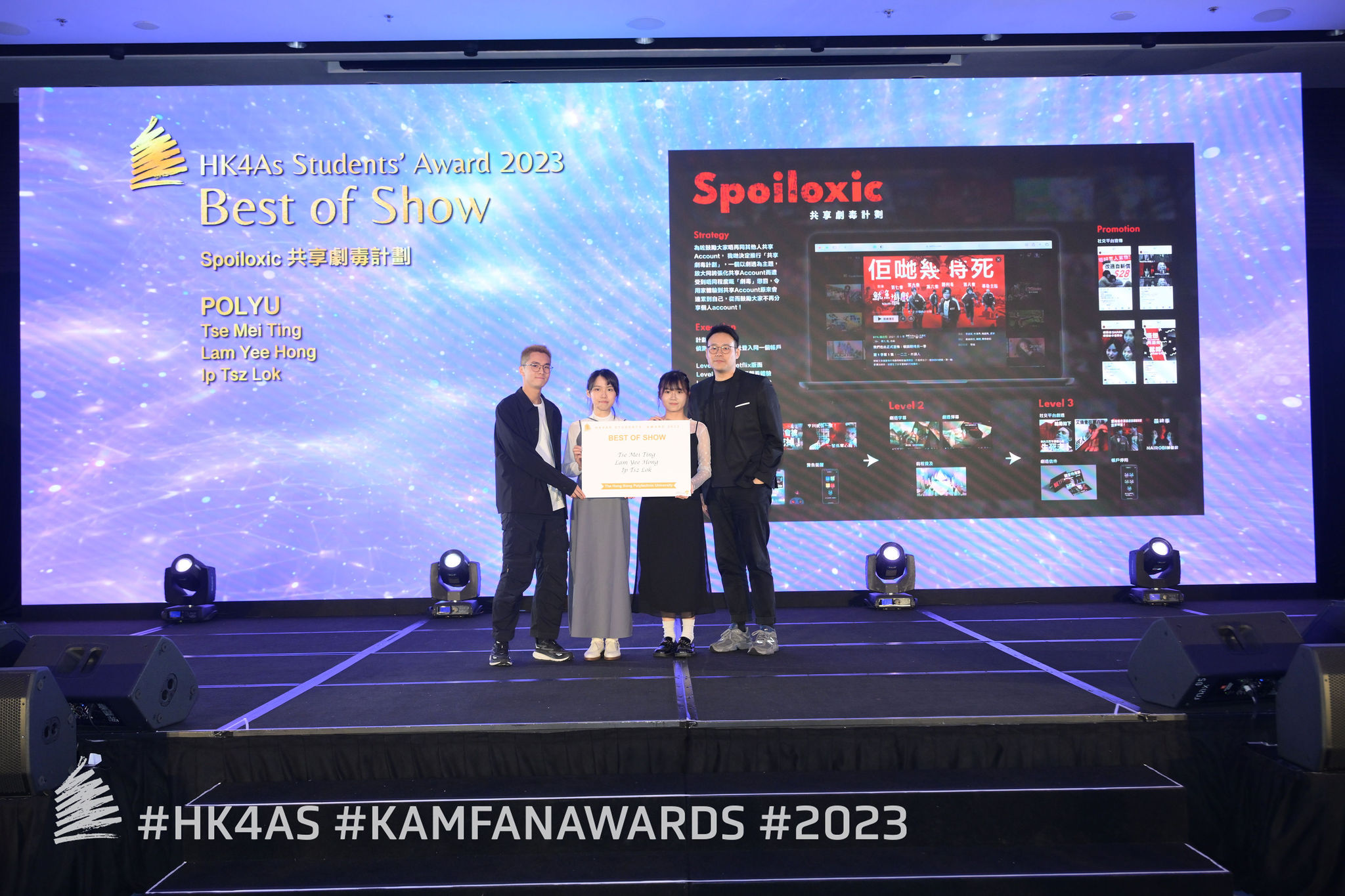The journey in the 4As Students’ Award began with a simple observation: people dislike spoilers. Mei Ting TSE, Hong LAM, and Jenny IP created “Spoiloxic”—a campaign that cleverly used spoilers to encourage users to get their personal accounts. The process was challenging, requiring the team to empathize with users and maintain focus on our core idea. Their PolyU tutors, Manto, and KC guided them with industry insights and encouraged the team to reflect on their progress.
Through this project, they learned the importance of clear communication, decision-making, and supporting teammates. Winning Silver & Best Of Show was exciting, but the true value was in mastering the creative process and understanding how to build effective campaigns. This experience has equipped the team with skills and confidence for future advertising challenges.

Ms. TSE Mei Ting
Mr. LAM Yee Hong
Ms. IP Tsz Lok Jenny
School of Design
Understanding the mindset and behaviors of streaming platform users was crucial in developing the Spoiloxic campaign. By empathizing with users and recognizing their dislike for spoilers, the team crafted a solution that directly addressed their needs and motivations, ensuring the campaign was relevant and impactful.
The process of building Spoiloxic involved observing user habits, brainstorming creative deterrents, and refining ideas through team discussions. This highlights the importance of generating, evaluating, and iterating on concepts to arrive at a unique and effective campaign strategy.
Designing the campaign required clear messaging that would resonate with the target audience. The use of spoilers as a strategic tool demonstrated how design can be leveraged to communicate a message in a memorable and persuasive way, influencing user behavior.
The campaign’s success depended on presenting spoilers in a way that was both engaging and disruptive. Designing graphics and visual elements that conveyed key plot points effectively required an understanding of visual hierarchy, narrative flow, and audience engagement.
Guidance from tutors and feedback at different stages helped the team follow a structured approach to campaign development. This included defining the problem, researching similar works, identifying a unique angle, and aligning every stage with the core idea—essential steps for successful design projects in advertising.
Throughout the project, effective communication was essential for aligning the team, sharing ideas, and providing feedback. Regular meetings and open discussions helped build trust and ensured everyone was on the same page. Learning to express thoughts directly and listen to others’ perspectives is a vital skill for any collaborative environment.
Developing the “Spoiloxic” campaign required innovative thinking to address the issue of account sharing in a unique way. The team observed user behavior and creatively used spoilers as a deterrent. This demonstrates the importance of approaching problems from different angles and finding original solutions—an invaluable skill in any field.
The project highlighted the significance of working together, dividing tasks, and supporting each other, especially during challenging moments. Admitting when help was needed and stepping in for teammates fostered a strong sense of unity. Collaborative skills are crucial for achieving common goals and overcoming obstacles.
Facing real-world challenges, such as keeping ideas focused and relevant, required the team to adapt quickly and stay resilient. When ideas strayed from the core concept, the team regrouped and realigned their efforts. Being adaptable and resilient helps individuals navigate change and persist through setbacks.
Guidance from tutors and feedback at different stages encouraged the team to reflect on their progress and identify areas for growth. Recognizing the value of feedback and being open to learning from experiences fosters continuous self-improvement—a key aspect of lifelong learning.
The pursuit of knowledge is a lifelong journey! To further expand your knowledge and continue your personal and professional growth. Click and explore the following learning resources:
Iterative Design and Reframing
Visual Communication and Data Visualization
Interdisciplinary Collaboration